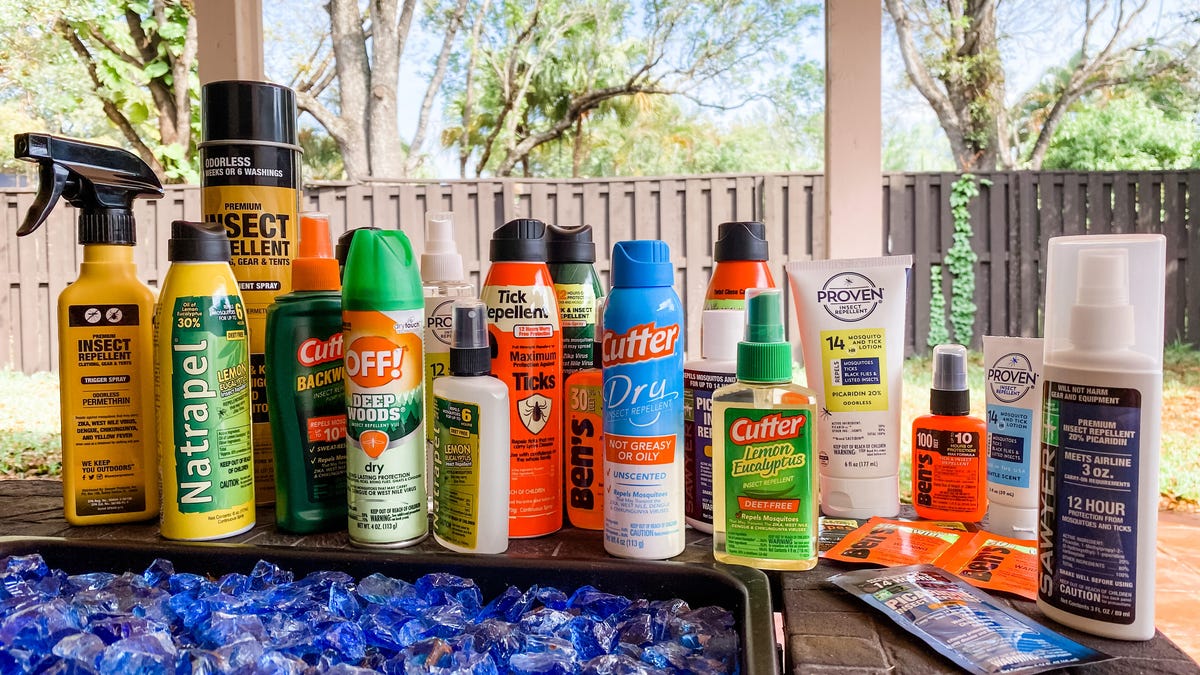
Best overall aerosol insect repellent
Cutter Dry aerosol spray
View details

Best overall pump spray insect repellent
Proven picaridin insect repellent
View details

Best natural insect repellent
Natrapel lemon eucalyptus insect repellent
View details

Best insect repellent for clothes and gear
Sawyer permethrin aerosol and pump spray insect repellent
View details

Best insect repellent lotion
Proven picaridin lotion
View details

Best insect repellent wipes
Ben’s 30% DEET wipes
View details

Best DEET-free insect repellent wipes
Natrapel picaridin wipes
View details
Whether you’re on a run or sitting on your patio, it’s important to protect your exposed skin from bug bites. We tested 20 bug repellents in the muggy, buggy South Florida heat. Avoid skin irritation and unpleasant odors with the best insect sprays.
When you live somewhere it’s so hot you start sweating upon opening your back door, adding an additional layer of stickiness is not an option. Cutter Dry insect repellent is the best bug spray by far in terms of feel.
The aerosol nozzle sprays wide and evenly, and the formula dries nearly instantly on your skin. You don’t have to rub this spray into your skin at all.
The bottle says unscented, but Cutter Dry does have a slight smell to it. It’s not overpowering like many other sprays, though, and definitely not intolerable.
Made with 10% DEET, this insect repellent will do its job in most environments. I would consider taking something stronger, such as a 20% or 30% DEET repellent, for backcountry adventures in buggy environments.
If you prefer to avoid aerosol sprays, Proven makes a great picaridin-based pump spray insect repellent. Picaridin is a synthetic compound derived from piperine, a chemical compound found in the family of plants that produce black pepper. It’s not as odorous as DEET, and according to some research, picaridin is equally as effective at repelling bugs as DEET.
The Proven picaridin pump spray is the only one I found to be truly odorless during my testing. I probably would have looked crazy to bystanders if they saw me smelling my skin and clothes to catch a whiff of this stuff.
For a pump spray, it doesn’t have a bad texture — plus, it goes on pretty light and I only had to rub it in a tiny bit. It absorbed quickly. Of all the bug sprays I’ve used in my life, this was my first time trying Proven, and I’ll likely buy it in the future.
For those who want to avoid chemicals altogether, a lemon eucalyptus insect repellent is a gentler way to stave off bugs and their bites. I tried a few different lemon eucalyptus bug sprays, and Natrapel came out on top.
Free of the two chemicals proven to repel insects, it’s natural to think this bug spray isn’t as effective as its DEET- or picaridin-containing counterparts. The CDC and EPA recognize lemon eucalyptus oil as an effective insect repellent. The Natrapel bottle does say it offers up to six hours of protection versus the typical eight to 12 in DEET and picaridin products.
Anyway, if you don’t mind applying more often, Natrapel’s aerosol or pump spray is a good option. Despite the fact that the active ingredient is an oil, this bug spray doesn’t feel as oily as you might expect. It is slightly tougher to rub in compared to DEET and picaridin sprays, but it’s not bad overall. Both types of bottles are easy to spray. Plus, the smell is nice (if you like lemon eucalyptus).
I’m obsessed with these permethrin insect repellents from Sawyer. I sprayed all of my fabric patio furniture and the tarp covering my home gym equipment. Permethrin is an insect repellent designed for clothes and gear — it is not to be used on the skin or on clothes while you’re wearing them. Seriously, heed the safety instructions.
The aerosol permethrin creates a nice wide, even, fast spray. I coated my outdoor furniture with this easily in a few seconds. The pump spray is less convenient but still good.
While the bottles say the product is odorless, I noticed a slight odor while using the sprays. It smelled similar to spray paint but far less potent. These bottles aren’t something I’d want to travel with — they’re rather large — so I would recommend spraying your gear before you head out for a camping trip or other outdoor adventure.
Sawyer’s permethrin spray lasts up to six weeks or through six washes.
Not a fan of sprays? Try Proven’s picaridin lotion. Like the Proven pump spray, the odorless lotion is truly odorless. The “gentle scent” lotion smells so nice I’d use it as regular lotion if I didn’t know it was an insect repellent!
This lotion uses the same 20% picaridin formula as the Proven pump spray. Conveniently sized, these bottles would be easy to travel with, and the smaller bottle is even appropriate for air travel.
I personally think lotion is better for hiking and on backpacking trips because it absorbs into the skin better. I feel like I’m less likely to sweat it out on hot, active days.
For extremely packable insect repellent, try wipes. I like Ben’s 30% DEET wipes because I know they’re effective and they’re easy to take anywhere. You can easily take insect repellent wipes on planes, toss a few in your day bag for unexpected bugginess and equip yourself with lightweight repellent for multiday outdoor excursions. On Amazon, you can get four packs of 12 wipes.
Wipes are also great if you don’t like spraying or rubbing lotion onto your skin — instead of rubbing dirt on your skin while applying a spray, these wipes actually clean your skin while adding bug protection. Wipes also make it easier to protect your skin while avoiding damage to your clothes. (At higher concentrations, DEET can leave marks on certain fabrics.)
Natrapel strikes again with picaridin insect-repellent wipes. The formula contains 20% picaridin and is nearly odorless with protection of up to 12 hours. These wipes are slightly softer than the Ben’s wipes above, but still wipe away dirt effectively.
Like the Ben’s wipes, these are extremely portable and can fit in just about any type of pack you plan on carrying. It’s a win-win all around.
The information contained in this article is for educational and informational purposes only and is not intended as health or medical advice. Always consult a physician or other qualified health provider regarding any questions you may have about a medical condition or health objectives.








/cdn.vox-cdn.com/uploads/chorus_asset/file/25803641/247455_Kindle_Scribe_SVasani_0001.jpg)


